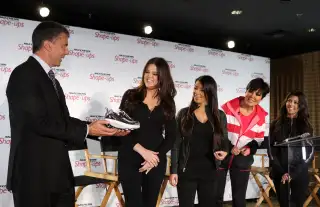Why We Always Fall for Products Making Outlandish Claims

Even the smartest consumers can be tempted to buy a product based on some marketing claim that, deep down, everyone knows can't be true. Why?
We live in a time when modern-day snake oil, in the form of not-so-miraculous "miracle" products that are misleading if not worse, is around every corner. For example, based on sales totals, it looks like more than 70 million Americans believed Vibram’s claim that running in "shoes" that brought you a step closer to jogging barefoot would improve their “foot health.” Vibram, creator of the thin-soled FiveFinger running shoes that fit each toe like a glove, was unable to substantiate that claim, and the company settled a $3.75 million lawsuit this spring, entitling buyers to refunds.
Last summer, Skechers began paying out a $40 million class action lawsuit to more than a half million people who believed it when the company (and spokesmodel Kim Kardashian) said the shoes could not only tone muscles but also help them lose weight and improve their cardiovascular health. Reebok and FitFlops have also lost lawsuits on behalf of millions of other consumers who believed similar overstatements about the power of shoes to basically do our workouts for us.
Though consumers apparently have a soft spot for supposedly miracle-performing footwear, we’re not just suckers for hyped-up claims about shoes. Millions have purchased weight-loss potions that promise users they'll lose fat without changing the exercise and eating habits that piled on the pounds in the first place; or lotions that can sprout new hair on bald heads. (It certainly doesn't help that medical experts like TV's Dr. Oz sometimes seem to endorse dubious weight-loss products.) This spring, the FTC announced that Lice Shield, a "lice-prevention" shampoo, deceived customers and exaggerated claims, and ordered the company to pay $500,000 and stop pretending that the product was "scientifically shown to repel head lice.” Another recent FTC settlement will stop the company that makes a supplement called BrainStrong Adult from claiming it has clinical proof the product "improves adult memory."
Sometimes, the claims are downright laughable, like the F-Cup Cookies sold in Japan that are supposed to make your breasts bigger.
How could anyone fall for such claims? How can people not know better? What’s behind our will to believe when common sense tells us otherwise? There are four particularly strong forces at work: one is human nature, and three are unique to our times.
1. We are hopeful. If we’re lucky, we have a healthy dose of a charming, positive and essential human quality: hope. Add a dash of that particularly American characteristic, optimism, and we have the potential to be led astray. Hope gives us the will to try, while optimism gives us fortitude. Untempered by common sense and logic, though, hope and optimism can devolve to gullibility. The solution is not to decrease hope—it's to blend in wisdom, and a bit of skepticism.
2. We see miracles in action every day. One marvelous technological advancement after another, from GPS systems to smartphones, has taught us to believe in innovation. “New” has never been better, and we eagerly await the next bit of wizardry. We’re more trusting and less skeptical of innovation, and therefore more likely to believe that the next big thing is really all that—the next big thing. That puts a damper on an age-old adage that’s kept us on the straight and narrow for years: “If it sounds too good to be true, it probably isn’t true.” Today's gadgets and innovations sometimes actually are as good as advertised. Which means consumers have to be craftier in ferreting out potentially false claims and examining the reputation of the source.
3. We have no attention spans. Evaluating products, and product claims, is harder today because of another side effect of technology—saturated with stimulation, we increasingly skim and rely on visual cues such as photos and symbolism to get the gist of what some hot new thing does. Nobody has ever been a fan of “fine print,” but today we’re less tolerant than ever. Nobody has the time or interest to dig deeper. Shorter attention spans have resulted in less patience to temper hope and optimism with thinking things through.
4. We are manipulated by marketers. Lastly, consumers are up against some brilliant marketing minds—professionals who are now armed with reams of data and psychological insights. Marketers increasingly use psychology to understand the deepest motivations of consumers and create the most resonant messaging. Most apply those insights to more fully satisfy consumers and gain an edge in a fiercely competitive marketplace. But some are less honest. Marketers have always been some of the best communicators in the world, and today they’re more aware and arguably better than ever.
Deep down, we want to believe in magic. Human beings always have. Thanks to the spectacular increase in innovation, from smartphones to self-driving cars, there's proof that products can do seemingly magical, miraculous things. But the existence of amazing gadgets isn't an excuse to lose grasp with reality. Smart shoppers temper hope, optimism, and awe with critical reasoning. It seems like a downer, but it’s never been more important.
_____________________________________________________
Kit Yarrow, Ph.D., is a consumer psychologist who is obsessed with all things related to how, when and why we shop and buy. She conducts research through her professorship at Golden Gate University and shares her findings in speeches, consulting work, and her books, Decoding the New Consumer Mind and Gen BuY.